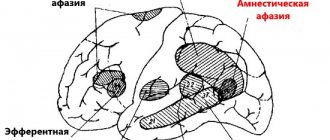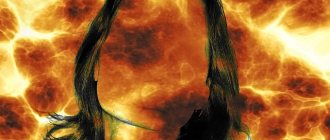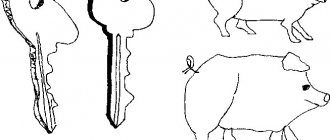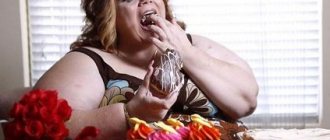Contents of the article:
- Types of compulsions
- Symptoms: when is it time to go to the doctor?
- Reasons for obsessive actions
- Emotional eating
- How to get rid of compulsions?
- Video about the causes of obsessive-compulsive disorder
With the development of knowledge about the human psyche, people began to think more often about which part of their behavior is normal and which is not. For example, psychologists became interested in the phenomenon of compulsion. What it is, how it manifests itself and whether it is dangerous to health are logical questions of behavioral science.
compulsion
Compulsion is a certain set of actions that a person performs obsessively, otherwise he will feel anxiety and fear. They occur periodically at intervals of time. They often arise in certain situations. If a person does not give in to impulse and does not perform “ritual” actions, then his level of anxiety will increase.
Compulsive actions often appear ritualistic. A person has already developed a certain order of actions. Examples include fanatical desires for cleanliness, when people clean the house unnecessarily or constantly wash their hands.
The development process of compulsion is defined as follows:
- A person begins to be afraid of something, and sometimes a phobia develops.
- In order to constantly avoid a frightening situation, a person begins to focus his attention.
- Gradually, an attitude is formed that helps to avoid an unpleasant situation - an obsession.
- To implement an attitude, it is necessary to perform an action that soon becomes constant, ritual or obsessive - compulsion.
Examples are the following situations:
- Fear of sleep provokes various rituals before falling asleep.
- Fear of dirt makes a person constantly wash something.
- Social fears provoke the study of social rituals between people.
- Fear of animals makes you avoid places with large concentrations of living creatures.
- Rereading, rewriting, rechecking, etc.
Some fears provoke opposite desires. If they are implemented, then a person will confirm his own thoughts. Eg:
- Fear of heights may be accompanied by a desire to jump down.
- Fear of homosexuality can lead one to think of every man as a sexual partner.
go to top
Literature
- Rycroft Ch. Critical Dictionary of Psychoanalysis. Per. from English L.V. Toporova, S.V. Voronin and I.N. Gvozdev, edited by Ph.D. philosopher. Sciences S. M. Cherkasova. - St. Petersburg; East European Institute of Psychoanalysis, 1995.
| This is a draft article on psychiatry. You can help the project by adding to it. |
Has it ever happened to you that it suddenly occurred to you that you forgot to turn off the kettle? Or did you leave the iron on? And when you went to the cafeteria, you bought a high-calorie dessert, although you only thought about drinking a cup of coffee. Have you ever thought about the sudden experience that, say, the cat could remain locked on the balcony? Have you seen how others check several times that all their car doors are closed? Or have you checked yourself, many times in a row, whether your windows at home are closed or whether the front door is locked? Have you ever wondered what if you left the faucet on in the kitchen? If you have had similar or similar thoughts, then this article will be interesting and useful to you.
Here the answers to the questions will be given: where do such thoughts come from, and what behavior do they provoke? One of the previous articles discussed the issue of habits. In this article we will only touch on this issue in order to separate the concepts of habit and unexpected desire to perform an action.
Compulsion - what is it?
Compulsion is obsessive ritual behavior accompanied by obsessions. A person practically cannot refuse them, because otherwise he will experience even greater anxiety. He can understand the absurdity of their implementation, uselessness and even harm. However, a bad mood develops, which is provoked by refusal to perform the “ritual”. What is compulsion?
Translated from English it means “coercion”. These are actions that a person finds difficult to resist. They are supposed to save him from dangers that in reality may not exist.
Let's consider the types of compulsion:
- From the characteristics of the flow:
- Temporary – lasts several days or years.
- Episodic - attacks of compulsion alternate with periods of health.
- Chronic – a constant course of the disease with temporary intensification of symptoms.
- From the characteristics of actions:
- Simple - tics, blinking, touches, that is, simple movements.
- Complex – the ritualism of specific actions.
- By nature of actions:
- Physical – performing specific actions.
- Mental – pronunciation of phrases, mental tuning.
Experts are trying to understand the causes of this syndrome. Compulsion and obsession are consequences of the following factors:
- Biological:
- Features of the functioning of the body or pathology in the brain.
- Increased genetic concordance.
- Features of the activity of the ganglion nervous system.
- Infectious factor.
- Neurotransmitter metabolism disorder: dopamine, norepinephrine, serotonin, γ-aminobutyric acid.
- Psychological:
- Personality characteristics.
- Character traits.
- Production problems.
- Family troubles.
- Sexual problems.
- Sociological - the presence of various problems that are present at the level of a group, family, team or the whole state.
- Cognitive – religious education, inadequate response to unusual situations.
Other factors that contribute to the development of compulsive actions include:
- Low stress resistance.
- Acute psycho-emotional state.
- Incorrect adaptation during age-related crises.
It is observed in people with a high level of intelligence, with average or low income, with insomnia and other sleep disorders, with higher education, in single or divorced people.
go to top
Classification
Before talking about the causes of compulsions, I want to touch on the topic of classification, because the mechanisms of occurrence of different types of compulsions are significantly different.
Conventionally, the following types of compulsions can be distinguished:
- Simple - a person is forced to perform a habitual action recorded in the past without a specific need, for example, twisting a ring on his finger, biting his lip, straightening his hair.
- Complex ones (they are also called rituals) - associated with specific fears (phobias), in this case a person begins to develop certain actions aimed at overcoming fears, only by completing them will he be able to maintain mental balance for some time.
How to get rid of compulsion?
It should be understood that getting rid of compulsion on your own is quite difficult. This requires care, judgment and critical evaluation. And since obsessive-compulsive disorders are rarely controlled by the ego, a person notices their occurrence after the end.
Not every compulsive behavior requires treatment. If it does not interfere with a person’s life, is calming and harmless, then you can leave it. If in this way a person helps himself to relax, then perhaps there is no need to run away from the mannerisms developed by the psyche.
If you want to get rid of compulsive actions, then you should decide in what situations they arise. It happens that a person temporarily begins to commit compulsive actions. This is due to stress, overwork or insomnia. In this case, you just need to calm down and relax.
If you cannot cope with the problem on your own and specific signs of compulsive behavior are observed, then you should seek psychological help. What should prompt you to see a psychotherapist?
- The compulsions have already been going on for a long time.
- Obsessive behaviors cause harm or cause negative emotions.
- It is impossible to get rid of compulsions with just a strong-willed desire.
- If actions are not taken, then fear, anxiety, obsessive thoughts, and depression arise.
- Compulsions appeared after a traumatic brain injury or an infectious disease.
If you receive help from specialists, then ordinary sedatives will not be enough. If the cause of compulsions is not eliminated, then all measures taken will be useless. It is necessary to be examined by a psychotherapist, as well as undergo treatment with him, so that he can help eliminate the psychological cause that causes obsessive thoughts and actions. Only their elimination can calm a person.
Related measures to prevent compulsive behavior may include:
- Maintaining a healthy lifestyle.
- Complete nutrition.
- Quality rest.
- Avoiding unnecessary stress.
go to top
Unequal deal
What happens if you engage in compulsive behavior?
The bottom line is this: You have traded 5-10 minutes of pleasure for 4-7 days of constant discomfort and heartache. How do you like this?
The deal is unprofitable. Too much interest for a short-term thrill.
The mechanism of compulsive behavior acts like a law
The mechanism of compulsive behavior is known. He won't act differently.
If you hope that after using a compulsive behavior that you will not experience pain later, you are mistaken. You will 100% get more than enough pain that you will be discouraged.
The question is, are you aware that this pain was caused by compulsive behavior or not?
To think that after compulsive behavior there will be no pain is also naive to think, just like being caught in the rain and hoping to stay dry.
The mechanism operates with impartial precision. This is the law.
It doesn’t matter whether you understand it or not, whether you are aware of it or not, whether you believe in it or not.
In all cases, proceed the same way:
You get long-term pain if you engage in compulsive behavior in the face of pain.
What's the conclusion?
Understanding the mechanism and the terrible consequences that you will get in the end, it is better NOT to use compulsive behavior at all.
Treatment of compulsions
An examination of the patient’s condition is necessary to identify the causes of compulsions, as well as to determine the necessary measures to eliminate them. Often, treatment of compulsions requires an integrated approach, which includes therapy:
- Medication – various antidepressants and tranquilizers, antipsychotic drugs. They are prescribed exclusively by a doctor, as they can provoke additional obsessive states.
- Psychotherapeutic – psychoanalysis, suggestion, cognitive behavioral psychotherapy, hypnosis.
- Physiotherapeutic – hardening, cold compresses, douches.
- Biological – atropinocomatous therapy.
Psychoanalysis is used only for mild forms of the disease. Severe forms of the disease provide only minor success.
Cognitive behavioral therapy helps not only to develop certain actions that a person can perform instead of compulsions, but also to understand the reasons for the development of the disorder. Here a person learns to master the fear that arises when he does not perform compulsive actions.
Family and group psychotherapy are becoming effective. Family psychotherapy helps in getting rid of compulsions that were provoked by problems in the family. Group psychotherapy allows a person to admit the presence of an illness and begin to correct it, which becomes easier to do among people who suffer from similar deviations.
You can help yourself through the courage shown at the moment of fear. Compulsions are based on the fear that a person is exposed to when he agrees to perform ridiculous and absurd actions. If you boldly face your own fear, you can overcome it.
It is also recommended to increase the number of compulsive actions performed. This allows a person to engage in the process and begin to realize the absurdity of the actions being performed.
go to top
Bottom line
The psyche is a complex structure that cannot yet be explained. Experts continue to study it in order to understand the causes of various disorders and help people overcome them. Compulsions are not always bad. However, harmful or senseless obsessive actions often lead to unpleasant results.
A person may look funny in the eyes of others. He may lose self-confidence due to his compulsive actions. The inability to resist one's own fear also does not help a person increase his self-esteem.
The help of psychotherapists in this case helps not only to prevent compulsive actions, but also to prevent their development and progression. The prognosis will be negative if a person simply does nothing. You should not ignore folk remedies for self-soothing and relaxation:
- Yoga.
- Herbal teas.
- Meditation.
- Listening to music, etc.











